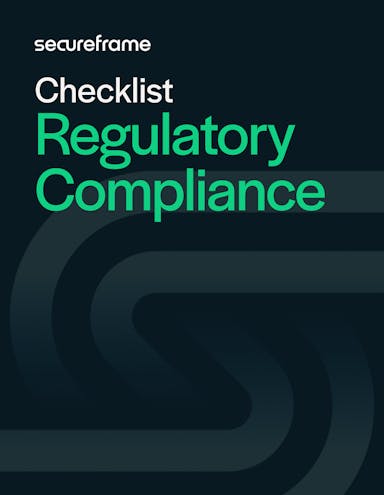
Non-Compliance Fines and Sanctions: Real Cases With $ Impact + Enforcement Trends to Watch in 2026
Anna Fitzgerald
Senior Content Marketing Manager
Rob Gutierrez
Senior Cybersecurity and Compliance Manager, CISA, CCSK, CMMC RP
The cost of non-compliance continues to rise—and fast.
According to IBM’s 2025 Cost of a Data Breach Report, the average cost of a U.S. data breach surged to $10.22 million this year, an all-time high for any region. Regulatory fines for non-compliance were among the biggest drivers of this increase. The report also found that globally breaches cost almost $174,000 more on average when non-compliance with regulations was a contributing factor.
And the price tag for non-compliance is not limited to breach costs. According to a landmark study by GlobalSCAPE and the Ponemon Institute, non-compliance costs 2.71 times more than maintaining compliance when you factor in fines, settlements, productivity loss, business disruption, and more.
In this article, we’ll focus on the financial risk of non-compliance, highlighting some of the most notable fines and sanctions issued in the past two years, and offer tips to avoid fines like these and other types of compliance risks.
Recommended reading

110+ of the Latest Data Breach Statistics to Know for 2026 & Beyond
Key enforcement trends to expect in 2026
Based on enforcement activity and settlements from 2025, regulators around the world are signaling where compliance expectations are headed next.
Below we outline emerging trends across major frameworks so you can anticipate what’s coming in 2026 and beyond—and take steps now to stay ahead of new enforcement priorities.
1. HIPAA enforcement is rising amid record breach activity.
As of October 30, 2025, the U.S. Department of Health and Human Services (HHS) Office for Civil Rights (OCR) has announced 19 settlements totaling more than $8 million. This already breaks the record of highest number of HIPAA resolution agreements in a single year.
This heightened enforcement activity makes sense given that there have been over 546 healthcare breaches affecting more than 42 million individuals reported year-to-date—with most linked to network server attacks involving business associates. (Note: These numbers include both resolved breach reports and breaches currently under investigation in the Breach Portal.)
Recent enforcement actions underscore OCR’s continued focus on organizations that fail to perform risk analyses, put adequate access controls in place, and issue timely breach notifications following ransomware and hacking incidents.
2. GDPR enforcement is maturing but remains uneven across Europe.
Now seven years old, the EU’s flagship data protection law continues to face challenges in consistent enforcement, even as GDPR fines climb to record levels—exceeding the €5.65 billion mark across 2,245 fines by March 1, 2025, as reported in the 2025 Enforcement Tracker Report. This represents a 26% increase in total fine value and a 7% increase in the number of fines year over year.
While regulators in Spain, Italy, and Romania continue to issue the highest number of fines by country, the Irish DPC remains the supervisory authority that has imposed the highest fines to date, with eight of the top ten highest fines in total.
Despite the European Data Protection Board’s continued concern about a lack of cooperation among national data protection authorities or harmonized enforcement culture, the data reported in the 2025 Enforcement Tracker Report shows that GDPR enforcement is continuing to expand in scope and impact.
3. CCPA enforcement is broadening and intensifying.
In 2025, the California Privacy Protection Agency (CPPA) announced settlements with record penalties totaling more than $2.3 million, including its largest fine to date—$1.35 million against a retailer for failing to maintain proper privacy notices and opt-out mechanisms for job applicants.
Recent settlements and actions, like increased scrutiny of data brokers under the Delete Act and resolution agreements requiring annual compliance reporting, demonstrate CCPA’s expanding scope and oversight.
4. Enforcement of DoD cybersecurity compliance is accelerating and becoming more expensive.
In 2024, the Department of Justice (DOJ) announced a $1.25 million settlement with Pennsylvania State University—the first False Claims Act (FCA) settlement related to non-compliance specifically with DFARS 7012, which requires implementation of NIST SP 800-171 requirements.
In 2025, the Department of Justice (DOJ) announced five more FCA settlements to resolve allegations of a failure to implement NIST 800-171 controls that were contractually required by government agencies through DFARS 7012. These settlements totalled more than $26 million in combined penalties. (Note: The DOJ’s settlements with Hill ASC Inc. and Illumina were not related to non-compliance with DFARS 7021 or NIST 800-171 specifically so they were not included in the 2025 count.)
These cases highlight how seriously the government is treating cybersecurity clauses in federal contracts—and this scrutiny is expected to intensify as CMMC certification becomes mandatory across the Defense Industrial Base (DIB).
These trends are already shaping enforcement actions across industries. The following real-world fines from the past two years illustrate how regulators are translating enforcement priorities into costly penalties for organizations that fall short.

Stay ahead of enforcement trends and costly penalties
Download this Regulatory Compliance Checklist today and take the first steps toward continuous compliance. Use it to develop or evaluate your regulatory compliance management program to help identify and close gaps before they result in fines or sanctions.
Biggest non-compliance fines in the past two years
Across industries and jurisdictions, regulators are issuing record-breaking penalties for violations of data protection, cybersecurity, and contractual compliance obligations. In just the past two years, organizations have paid millions in fines for non-compliance with regulations such as HIPAA, GDPR, CCPA, and DFARS 7012 (for NIST 800-171).
Below, we break down some of the most significant enforcement actions—organized by regulatory framework and ordered from largest to smallest within each—to show just how expensive non-compliance can be.

HIPAA non-compliance fines
The HHS OCR has issued more than $161 million in fines for HIPAA violations since enforcement began in 2003. While HIPAA penalties peaked at nearly $29 million in 2018, enforcement has steadily increased. So far in 2025, OCR has imposed over $8 million in fines across 19 settlements—which has already broken the record for the highest number of resolution agreements in a year.
Let’s take a look at some of the biggest penalties in recent years below.
1. Montefiore Medical Center - $4.75 Million
Year issued: 2024
Cause: Lack of safeguards to secure and protect ePHI
In February 2024, Montefiore Medical Center reached a settlement with the HHS over potential HIPAA Security Rule violations, agreeing to pay $4.75 million and submit to a corrective action plan.
This first HHS settlement of 2024 came after the NYPD informed Montefiore Medical Center that there was evidence that patient information had been stolen from the hospital’s database and an HHS investigation discovered that a malicious insider had been stealing patient data and selling it to an identity theft ring for six months.
Key takeaways:
- Develop a written risk management plan to address and mitigate security risks.
- Develop a plan to implement hardware, software, and/or other procedural mechanisms that record and examine activity in all information systems that contain or use ePHI.
2. Solara Medical Supplies, LLC - $3 Million
Year issued: 2025
Cause: Multiple breaches of unsecured electronic protected health information (ePHI)
In January 2025, Solara agreed to pay $3 million to settle potential violations of the HIPAA Security and Breach Notification Rules after a breach exposed the electronic protected health information of over 114,000 individuals and then a second breach occurred when Solara sent 1,531 breach notification letters to the wrong mailing addresses.
Key takeaways:
- Conduct an accurate and thorough risk analysis to determine the potential risks and vulnerabilities to the ePHI in its systems.
- Implement sufficient security measures to reduce those risks and vulnerabilities to a reasonable and appropriate level.
- Provide timely breach notification to individuals, HHS, and the media.
3. Warby Parker - $1.5 Million
Year issued: 2025
Cause: Failure to conduct a risk analysis and implement adequate safeguards to protect ePHI
In December 2024, the OCR imposed a $1.5 million civil money penalty against Warby Parker, Inc., following an investigation into multiple cybersecurity breaches that exposed the electronic protected health information (ePHI) of nearly 200,000 individuals.
OCR’s investigation began after Warby Parker reported a credential stuffing attack—where unauthorized third parties used stolen usernames and passwords from unrelated sites to access customer accounts between September and November 2018. The investigation found Warby Parker violated multiple provisions of the HIPAA Security Rule.
Key takeaways:
- Credential-stuffing attacks remain a common vector for unauthorized access to health information.
- Proactively identify and mitigate risks to ePHI—don’t wait until a breach occurs.
- Maintain continuous vigilance through documented risk analyses and regular information system reviews.
4. Gulf Coast Pain Consultants, LLC - $1.19 Million
Year issued: 2024
Cause: Workforce access violation
In December 2024, Gulf Coast agreed to pay $1.19 million to settle potential HIPAA violations after a terminated contractor accessed the ePHI of over 34,000 individuals and then filed medical claims for services that were not actually rendered, resulting in approximately 6,500 false Medicare claims. This case underscores the importance of securing servers containing sensitive data.
Key takeaways:
- Implement regular reviews of information system activities to detect unauthorized access, threats or vulnerabilities.
- Maintain and adhere to procedures for terminating access to ePHI when a workforce member’s employment or contract ends.
- Implement policies and procedures for modifying a user’s right of access to a workstation, transaction, program or process, or an alternative equivalent measure.
Recommended reading

HIPAA Violation Examples in 2025: 20 Common Violations With Real-World Enforcement Cases
GDPR non-compliance fines
Since the General Data Protection Regulation (GDPR) went into effect in May 2018, organizations across the EU and beyond have faced substantial fines for failing to protect consumer data. As of March 2025, regulatory authorities have issued 2,245 fines totalling 5.65 billion euros, with the average fine being 2.36 million euros across all countries.
Below are some of the largest GDPR fines in recent years. Please note that we focused on more recent examples in 2024 and 2025 rather than the largest ones to date.
5. TikTok – €530 million ($573 million)
Year issued: 2025
Cause: Unlawful transfers of EEA user data to China and failure to meet transparency requirements
In May 2025, the Irish Data Protection Commission (DPC) fined TikTok Technology Limited €530 million after concluding that the company’s transfers of European user data to China violated the GDPR.
Specifically, the DPC found TikTok failed to verify, guarantee, and demonstrate that data accessed by staff in China was afforded a level of protection equivalent to that within the EU, as required by Article 46(1). The DPC also determined that TikTok’s 2021 Privacy Policy did not meet GDPR transparency requirements (Article 13(1)(f)), as it failed to name the countries to which user data was transferred or to explain the nature of remote access by Chinese personnel.
In addition to imposing administrative fines totalling €530 million, the decision ordered TikTok to bring its processing into compliance within six months and warned that data transfers to China would be suspended if it failed to do so.
Key takeaways:
- GDPR enforcement continues to focus on cross-border data transfers, particularly involving jurisdictions without adequacy decisions.
- Controllers must conduct and document risk assessments that adequately assess the level of protection provided by third-country laws and practices when transferring the personal data of EEA users.
6. LinkedIn - €310 Million ($335 Million)
Year issued: 2024
Cause: Insufficient legal basis for data processing
In October 2024, the Irish DPC fined LinkedIn Ireland Unlimited Company €310 million for processing users' personal data without a valid legal basis. The DPC’s investigation found LinkedIn did not have a lawful basis to gather data so it could target users with online ads.
Because it violated the principles of lawfulness, fairness, and transparency when processing personal data for advertising purposes, this was considered a clear and serious violation.
Key takeaways:
- Provide clear, transparent information to users about use of their personal data so that users are not properly informed of how their data would be processed and the specific legal grounds for doing so.
7. Uber - €290 Million ($312 Million)
Year issued: 2024
Cause: Non-compliance with general data processing principles
In August 2024, the Dutch Data Protection Authority (DPA) fined Uber €290 million related to the transfer of driver’s personal data to the US. Its investigation found that Uber had been unlawfully transferring sensitive personal data of European drivers to the United States for over two years and failed to appropriately safeguard this data. To date, this is the third time Uber has been fined by the Dutch DPA.
Key takeaways:
- Establish a valid transfer instrument for the international transfer of personal data.
8. Meta - €251 Million ($263.5 Million)
Year issued: 2024
Cause: Insufficient technical and organisational measures to ensure information security
In December 2024, the DPC fined Meta €251 million for a 2018 security breach that affected 29 million Facebook users. Attackers exploited a vulnerability in the "View As" feature, exposing personal information such as names, contact details, locations, workplaces, dates of birth, religions, genders, and children's data. Approximately 3 million of the affected accounts were based in the EU and European Economic Area. The DPC highlighted the grave risk of misuse of these data types due to the breach
Key takeaways:
- Ensure that data protection principles are protected in the design of processing systems.
- Ensure that only personal data that are necessary for specific purposes are processed.
9. Orange Espagne - €1.2 Million ($1.3 Million)
Year issued: 2025
Cause: Insufficient technical and organizational measures to ensure information security
In February 2025, the Spanish Data Protection Authority (AEPD) fined Orange Espagne €1.2 million for multiple GDPR violations, including failure to implement necessary technical and organizational measures for data protection by design, as required by Article 25 of the GDPR, and infringing Article 6(1). The latter was related to a complaint about Orange Espagne issuing a duplicate SIM card without proper identity verification, leading to a €9,000 theft from the complainant's bank accounts and the complainant left without service.
Key takeaways:
- Integrate privacy into your systems and processes from the outset in order to meet data protection by design and default requirements.
CCPA non-compliance fines
Since taking effect in 2020, the California Consumer Privacy Act (CCPA) has empowered consumers with greater control over their personal data and imposed strict requirements on businesses handling Californian residents' information.
The California Attorney General and California Privacy Protection Agency (CPPA) have enforced fines on companies that fail to disclose data practices, honor consumer privacy rights, or properly secure sensitive information, starting with the landmark $1.2 million settlement with Sephora for failing to disclose that it was selling consumers' personal information and not honoring their requests to opt out of such sales.
While there is no enforcement tracker for CCPA as amended by CPRA similar to the one for GDPR, the CPPA has continued to make announcements about fines and settlements on its website on an ongoing basis.
Here are some of the largest CCPA non-compliance penalties in the last two years.
10. Tractor Supply Company – $1.35 million
Year issued: 2025
Cause: Failure to maintain proper privacy notices, opt-out mechanisms, and job applicant privacy protections
In September 2025, the CPPA issued a decision requiring Tractor Supply Company, the nation’s largest rural lifestyle retailer, to pay a $1.35 million fine for multiple violations of the CCPA. The fine is the largest in the CPPA’s history and the first to address privacy rights for job applicants.
In addition to the monetary penalty, Tractor Supply agreed to implement comprehensive corrective measures, including scanning all digital properties to identify tracking technologies and requiring a corporate officer or director to certify compliance annually for four years.
Key takeaways:
- The CPPA is broadening enforcement to include employee and applicant data, not just consumer data.
- Review your privacy notices and opt-out mechanisms for job applicants, not just customers, to ensure compliance with CCPA.
11. American Honda Motor Co., Inc. - $632,500
Year issued: 2025
Cause: Mishandling customer data and obstructing privacy rights
In March 2025, the California Privacy Protection Agency fined Honda $632,500 for making it unnecessarily difficult for consumers to exercise their privacy rights, such as opting out of data sharing.
Honda required excessive personal information for such requests and shared data with advertising companies without proper contracts. This was the first settlement in 2025 not involving data brokers.
Key takeaways:
- Do not require consumers to verify Requests to Opt-Out of Sale/Sharing and Requests to Limit Sensitive Personal Information.
- Only require a consumer to provide the minimum information needed to initiate and verify (if permitted) a rights request, like Right to Limit.
- Train personnel handling CCPA requests on the proper ways to intake and respond to them.
12. Key Marketing Advantage, LLC – $55,800
Year issued: 2024
Cause: Failure to provide required consumer opt-out mechanisms for data sales
The Enforcement Division of the CPPA reached a settlement with Key Marketing Advantage, LLC, fining the data broker $55,800 for failing to register and pay an annual fee as required by the Delete Act. Part of the CCPA’s investigative sweep of data broker registration compliance under the Delete Act, this was the fifth administrative fine against an unregistered data broker in 2024.
Key takeaways:
- Data brokers must register and pay an annual fee to comply with California’s Delete Act— or face fines of $200 per day.
NIST 800-171 non-compliance fines
In 2021, the DOJ launched its Civil Cyber-Fraud Initiative to pursue False Claims Act (FCA) cases against contractors that misrepresent their cybersecurity compliance. These cases reflect the DOJ’s ongoing commitment to holding federal contractors accountable for protecting sensitive government information.
Today, that scrutiny is intensifying—particularly for organizations that handle sensitive defense information and fail to implement NIST 800-171 controls as contractually required under DFARS 252.204-7012 and soon to be CMMC. The message is clear to the Defense Industrial Base: CMMC non-compliance will be pursued.
Let’s take a look at some of the most recent and significant cases.
13. Health Net Federal Services, LLC & Centene Corporation – $11 million
Year issued: 2025
Cause: Failure to meet contractual cybersecurity controls under TRICARE program
In February 2025, Health Net Federal Services (HNFS) and its parent company, Centene Corporation, agreed to pay over $11 million to resolve allegations that they failed to meet certain DoD cybersecurity requirements and falsely certified compliance with them in annual reports for three years while administering the TRICARE West Region contract.
Specifically, the DOJ alleged that HNFS failed to fully implement and maintain the 110 NIST 800-171 controls required by DFARS 252.204-7012 as well as 51 security controls listed in NIST 800-53 Revision 4, which put servicemember data and protected health information at risk.
As a result of these allegations of failing to uphold its cybersecurity requirements, HNFS stopped delivering healthcare services under its TRICARE West Region contract on Dec. 31, 2024.
Key takeaways:
- Organizations must fully achieve and maintain continuous compliance with contractual cybersecurity requirements, not just attest at award time.
- Falsely certifying compliance can result in multimillion-dollar FCA settlements and loss of contracts.
14. Raytheon Companies & Nightwing Group – $8.4 million
Year issued: 2025
Cause: Non-compliance with cybersecurity requirements in federal contracts
In May 2025, the DOJ announced that Raytheon Companies and Nightwing Group agreed to pay $8.4 million to settle allegations that they failed to comply with required cybersecurity measures on multiple federal contracts. The companies allegedly failed to protect covered contractor information systems in accordance with both NIST 800-171 (as required by DFARS 7012) and FAR 52.204-21, including failing to develop and implement a system security plan (SSP).
Key takeaways:
- DoD expects all prime and subcontractors, regardless of size, to fully implement cybersecurity requirements and accurately represent their compliance in bids, proposals, or progress reports.
- Contractors must have a detailed SSP that documents precisely how systems comply with each NIST SP 800-171 and FAR 52.204-21 requirement.
15. MORSECORP, Inc. – $4.6 million
Year issued: 2025
Cause: Knowing non-compliance with NIST 800-171 and DFARS 7012
In April 2025, the DOJ reached a $4.6 million settlement with MORSECORP, Inc., a small defense contractor accused of falsely certifying compliance with NIST 800-171 cybersecurity requirements specified in its contracts with the Departments of the Army and Air Force. This marked the ninth FCA settlement under the Civil Cyber-Fraud Initiative.
The DOJ found multiple failures, including use of a third-party cloud email host that was not FedRAMP Moderate equivalent, lack of a comprehensive SSP for covered information systems, and submission of a false cybersecurity self-assessment score.
In 2021, MORSE reported a score of 104 based on its implementation of NIST 800-171 controls in the Supplier Performance Risk System (SPRS), but a 2022 independent review found the true score to be –142, with only approximately 22% of controls implemented fully and requiring over 70 Plans of Actions and Milestones (POA&Ms) to remediate these gaps. MORSE failed to update its score in SPRS for nearly a year, only doing so after receiving a DOJ subpoena when it submitted a third-party score of 57.
Key takeaways:
- Submitting inaccurate or inflated SPRS self-assessment scores can constitute a False Claims Act violation and result in hefty fines.
- Contractors of all sizes must meet contractual requirements, including implementing all 110 controls in NIST 800-171 and documenting compliance accurately in an SSP.
- Contractors must verify that all external cloud service providers meet requirements equivalent (or higher) to the FedRAMP Moderate Baseline and DFARS 7012.
Recommended reading

SPRS and CMMC: How to Get a Current CMMC Status to Stay Eligible for DoD Contracts After November 2025
What are non-compliance fines and sanctions?
Non-compliance fines and sanctions are penalties imposed on businesses or individuals who fail to adhere to regulatory requirements. While we’ve focused on dollar amounts, these penalties go beyond monetary fines and vary depending on the industry, governing body, and severity of the violation.
They often include:
Monetary fines
As shown above, regulatory non-compliance can result in hefty financial penalties ranging from thousands to millions of dollars. For example, the EU’s GDPR can impose fines of up to 4% of a company’s annual global revenue for violations. This was the case for Meta, which was fined €1.2 billion in 2023 for having an insufficient legal basis for data processing. This remains the largest GDPR fine to date.
Legal action
Regulatory bodies may take legal action, leading to lawsuits or criminal charges. For instance, companies that commit financial fraud under the Sarbanes-Oxley Act (SOX) may face criminal prosecution, and executives can be personally held liable.
Recently, in June 2024, the Securities and Exchange Commission (SEC) issued more than $500,000 in SOX penalties and fines to the former chief financial officer at Synchronoss Technologies for allegedly falsifying financial statements and lying to the company’s auditor. This came after Synchronoss reached a $12.5 million settlement with the SEC for engaging in “long-running accounting improprieties” in June 2022.
Operational restrictions
Businesses may face restrictions, such as losing the ability to process transactions or operate in certain markets. For example, a payment processor found in violation of PCI DSS requirements may be prohibited from handling credit card transactions, impacting revenue and customer trust.
Take Heartland Payment Systems for example. After a data breach in 2008 that compromised as many as 130 million debit and credit cards, the company was found in violation of PCI DSS and faced a 14-month ban from processing credit card payments.
Reputational damage
Public exposure of non-compliance can erode customer trust and negatively impact brand reputation. Data breaches or regulatory violations can lead to loss of customers and difficulty in securing business partnerships.
For example, when Sephora was fined $1.2 million in 2022 under the CCPA for failing to properly disclose its data-sharing practices and honor consumer opt-out requests, it faced significant negative press and loss of consumer trust as the first public CCPA enforcement.
Loss of government contracts and funding
Organizations that fail to comply with government regulations may lose contracts or funding opportunities.
For example, as mentioned above, the military health benefits administrator Health Net Federal Services (HNFS) not only had to pay $11.2 million to settle allegations that the company falsely certified compliance with cybersecurity requirements for three years in a contract with the U.S. Department of Defense to administer the TRICARE program. They also lost that contract, compounding the loss of revenue due to noncompliance.
Lost deals
Many businesses require their partners and vendors to maintain strict compliance standards, and these often go beyond regulatory requirements to include commercial frameworks like SOC 2. Enterprises that have strong security and privacy standards may refuse to work with vendors who fail to meet those standards, resulting in lost revenue and missed growth opportunities.
This was the case for India-based fintech company Refyne, which lost several deals before getting a SOC 2 report to prove their strong security posture.
“Secureframe had a great indirect impact on our business. We closed several deals just because of the quick turnaround time with Secureframe. We also managed to crack the public sector, with several state governments comfortable with our security."—Vineet Mishra, Head of Information Security and Privacy at Refyne
Recommended reading

The Competitive Advantage of Compliance: 9 Reasons to Prioritize Data Security and Privacy
Common causes of non-compliance
Organizations can face compliance fines and sanctions for various reasons, including:
- Intentional violations: Willful non-compliance with regulations such as GDPR, HIPAA, SOX, DPDPA, and DORA can lead to more severe penalties. For example, when calculating GDPR fines, data protection regulators use a range of criteria, including intention. If the infringement was intentional, then that is likely to make the fine higher than if the infringement was the result of negligence.
- Lack of awareness: Rather than willfully ignoring regulatory requirements, organizations may be unaware of regulatory requirements that are specific to their industry, location, or the type of data they process. This is particularly true in industries with constantly evolving compliance standards, like critical infrastructure sectors, where compliance and risk professionals may struggle to keep abreast of upcoming regulatory and legislative changes.
- Misunderstanding or misinterpretation: If aware of regulations, companies may still fail to comply by misinterpreting the requirements and implementing controls ineffectively to meet those requirements. Typically, framework requirements are either very specific and complex or broad and too general to know what exactly needs to be implemented without former audit or compliance experience. This lack of knowledge and expertise can lead to compliance issues.
- Inadequate data protection measures: As a result of negligence or other reasons, organizations may put inadequate security measures in place. Mishandling or exposing sensitive customer data as a result of inadequate safeguards can lead to violations of GDPR, CCPA, HIPAA, PCI DSS, and other regulations, resulting in significant fines and sanctions.
- Failure to implement required security controls: Organizations may fail to implement effective security controls for a variety of reasons. In addition to the lack of skilled personnel and human error mentioned above, budget and time constraints, inadequate documentation, unenforced policies, and technical issues may lead to failure. Not following mandated regulatory requirements such as HIPAA or CMMC can respectively result in fines or other financial consequences like lost contracts.
- Lack of executive buy-in: Compliance initiatives require leadership support to be effective. When executives do not prioritize compliance, organizations may struggle to allocate resources, enforce policies, and build a culture of security, ultimately leading to compliance risks.
- Lack of internal policies and training: Employees who are unaware of compliance requirements may unintentionally violate regulations. For example, mishandling patient data due to a lack of training can lead to HIPAA fines.
- Failure to conduct audits and assessments: Not performing required compliance audits or risk assessments can lead to regulatory action. For example, organizations that fail to conduct HIPAA risk assessments may be fined for negligence.
- Insufficient incident response planning: Organizations that do not have a proper incident response plan may fail to report breaches in a timely manner, resulting in fines. For example, under GDPR, businesses must report breaches within 72 hours, or they may face penalties.
- Use of outdated security technology: Legacy systems and outdated security tools often hinder an organization’s ability to keep pace with the demands of compliance and risk management. Organizations that fail to update their technology may be more vulnerable to security breaches and compliance violations, increasing their risk of regulatory penalties.
- Reliance on manual processes: Manual processes are inefficient and prone to error, which can leave your organization vulnerable to compliance risk. For example, relying on manual evidence collection requires gathering screenshots, tickets, and other types of evidence, compiling spreadsheets, working with disparate tools and sources of data, and chasing different team members for evidence. Not only is this process time- and resource-intensive, but it is also plagued by issues like incorrect data entry, overlooked information, inconsistency, lack of standardization and scaleability, which can lead to inaccuracies in compliance reporting and other issues.
Recommended reading

5 Hardest Things About Security Compliance and How Technology Can Help
How to avoid non-compliance fines and sanctions
Below are key tips and best practices for avoiding fines and other consequences of non-compliance.
1. Implement robust security measures
Organizations should use encryption, access controls, intrusion detection systems, and other security measures to protect critical assets. A security framework helps define policies and procedures for establishing and maintaining security controls.
Consider widely-recognized security frameworks like ISO 27001, NIST 800-53, and CIS Critical Security Controls® to implement best practices for securing sensitive data.
2. Provide employee training programs
Educating employees about security and privacy best practices related to their job and/or organization is crucial to defending your organization and meeting compliance requirements. Most cybersecurity frameworks require security awareness training to be conducted regularly. Some of these frameworks require additional topics to be covered in the training, like insider threats.
Frameworks like PCI DSS, CMMC, NIST 800-171, and NIST 800-53, also require specific training on secure coding practices. HIPAA, PCI DSS, GDPR, and CCPA require framework-specific training. HIPAA training must cover the different rules to safeguard PHI whereas PCI DSS covers payment account data. GDPR and CCPA are specialized privacy training with content specific to those laws.

3. Conduct regular audits
Regular audits, including internal and external audits, penetration tests, and vulnerability scans, help businesses proactively identify and address compliance gaps before they result in penalties. By assessing security controls, reviewing policies, and ensuring continuous alignment with regulatory compliance requirements, organizations can stay ahead of compliance risks.
4. Engage compliance experts
Consulting with compliance managers ensures businesses comply and stay up to date with evolving regulations. These experts can help with a variety of responsibilities, including:
- identifying compliance requirements
- designing policies
- conducting risk assessments
- monitoring and reviewing internal processes
- liaising with audit firms and regulatory bodies
- training and educating employees
- navigating complex regulatory landscapes
5. Leverage automation
Using a compliance management system with automation and AI helps organizations manage, scale, and continuously monitor their compliance program over time.
This software can integrate with your technology stack and provide control mapping to dozens of frameworks to tell you exactly what tasks you need to complete — they also help automate these tasks required to get and stay compliant, including evidence collection, continuous monitoring, policy management, risk assessments, and task management. They can also help detect and flag non-compliance issues so you can fix them quickly and proactively rather than scrambling to put out fires right before an assessment or before they escalate into an incident.
This mitigates many of the common causes of non-compliance like negligence, misinterpretation, inadequate or missing controls, and more.
Recommended reading

Why Compliance Automation is a Strategic Advantage for Modern Organizations
How Secureframe can help you avoid fines for non-compliance
Achieving and maintaining compliance can be complex and time-consuming, but Secureframe simplifies the process. Our platform helps businesses automate compliance workflows and continuously monitor security controls to help ensure adherence to over 40+ regulatory and commercial frameworks like CMMC, HIPAA, PCI DSS GDPR, SOC 2, ISO 27001, and more.
With Securerame, you get:
- A compliance source of truth: See all of your policies and documentation in one place and automatically collect evidence for internal review.
- Automated evidence collection: Automate manual evidence collection utilizing 400+ out-of-the-box integrations with tests that are mapped directly to framework requirements and controls.
- Dashboards: Use our dashboards to see exactly how close you are to satisfying the requirements of the frameworks you’re pursuing and get actionable advice for closing any gaps.
- Task management: Assign tasks to employees within your organization and set notifications to ensure they are completed so you stay audit-ready and compliant.
- Trusted audit partners: Work with one of our recommended auditors to make the audit process as seamless as possible.
- Continuous monitoring: Continuously monitor your controls and systems to maintain a strong security and compliance posture 24/7.
- Control mapping: Controls are mapped across frameworks to speed up time-to- compliance and avoid duplicate work when complying with multiple frameworks.
- Expert support from our in-house compliance team: Get guidance and answers to any questions you may have from compliance managers.
Learn how you can reduce the risk of fines and sanctions while maintaining a strong security and compliance posture with Secureframe — request a demo today.
This post was originally published in April 2025 and has been updated for comprehensiveness.
Use trust to accelerate growth
FAQs
What are the consequences of non-compliance?
Non-compliance can lead to monetary fines, legal action, operational restrictions, reputational damage, and loss of business opportunities, including government contracts and funding and other deals that hinge on meeting security and compliance standards.
How can businesses stay compliant?
Regular audits, employee training, automated continuous monitoring, and expert guidance can help businesses stay compliant.
Which industries face the highest compliance risks?
Healthcare, finance, ecommerce, and technology companies face significant compliance risks due to stringent data protection regulations, the global nature of their operations, and increasing regulatory scrutiny.
What are the most common causes of HIPAA non-compliance?
According to the HHS, the compliance issues most often alleged in these complaints are:
- Impermissible uses and disclosures of protected health information
- Lack of safeguards of protected health information
- Lack of patient access to their protected health information
- Lack of administrative safeguards of electronic protected health information
- Use or disclosure of more than the minimum necessary protected health information

Anna Fitzgerald
Senior Content Marketing Manager
Anna Fitzgerald is a digital and product marketing professional with nearly a decade of experience delivering high-quality content across highly regulated and technical industries, including healthcare, web development, and cybersecurity compliance. At Secureframe, she specializes in translating complex regulatory frameworks—such as CMMC, FedRAMP, NIST, and SOC 2—into practical resources that help organizations of all sizes and maturity levels meet evolving compliance requirements and improve their overall risk management strategy.

Rob Gutierrez
Senior Cybersecurity and Compliance Manager, CISA, CCSK, CMMC RP
Rob Gutierrez is an information security leader with nearly a decade of experience in GRC, IT audit, cybersecurity, FedRAMP, cloud, and supply chain assessments. As a former auditor and security consultant, Rob performed and managed CMMC, FedRAMP, FISMA, and other security and regulatory audits. At Secureframe, he’s helped hundreds of customers achieve compliance with federal and commercial frameworks, including NIST 800-171, NIST 800-53, FedRAMP, CMMC, SOC 2, and ISO 27001.